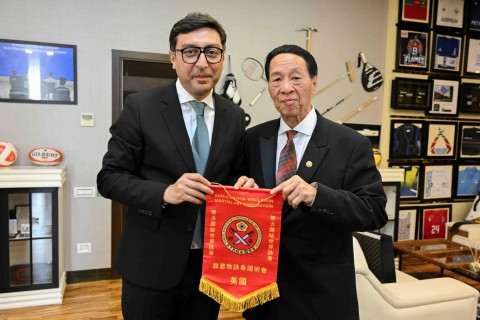One of the world’s most renowned martial artists, Grandmaster Samuel Kwok, a student of the legendary Ip Man and holder of the title Living Legend, shared his thoughts in an exclusive interview with AZERTAC about his visits to Azerbaijan and the rising popularity of martial arts in the country.
– What are your impressions of your visits to Azerbaijan?
– This is my third visit to Azerbaijan, and each time I am warmly welcomed. I have witnessed not only the country’s natural beauty but also the strength of its traditions and the deep respect people have for martial arts. Azerbaijan has a rich cultural heritage, and the balance it maintains between modern development and traditional values continues to impress me. Being here again is truly a pleasure.
– How do you assess the interest in martial arts among the youth in Azerbaijan?
– I see a strong and growing interest in martial arts among the younger generation. The enthusiasm, discipline, and dedication of the students I met during seminars are remarkable. It’s clear that martial arts here are viewed not just as a sport but also as a way of life and personal development, which perfectly aligns with the spirit of Wing Chun. Azerbaijani culture is deeply rooted in values like respect, hospitality, and strength — qualities that harmonize beautifully with martial arts. The practitioners I encountered were respectful, eager to learn, and highly disciplined. Their open-mindedness and humility made a positive impression on me. I believe these individuals have the potential not only to become skilled fighters but also wise martial arts teachers.
– What feelings did the hospitality you experienced in Azerbaijan evoke?
– Your hospitality is genuinely heartfelt. I felt like a member of the family, not just a guest. Such warm relations foster a strong bond between teachers and students, which makes me happy. The respect shown to guests and elders in Azerbaijani culture resonates strongly with the traditional values of martial arts.
– Do you plan to hold more seminars or regular training sessions in Azerbaijan in the future?
– Absolutely. Given the enthusiasm and dedication I have seen here, I would be delighted to organize more seminars and even regular training programs. I thank the Azerbaijan Wing Chun Federation for promoting this martial art in the country. Their work lays a solid foundation for long-term development.
– What distinguishes Wing Chun from other martial arts?
– Wing Chun is a close-range combat system focused on efficiency, simplicity, and sensitivity. What sets it apart is its scientific approach to movement and energy. It relies not on brute strength but on structure, timing, and intelligent use of energy. A weaker person can defend against a stronger opponent by using the technique correctly. This reflects Wing Chun’s roots as a practical self-defense system for real life.
At the core of Wing Chun training is the unique and dynamic sensitivity exercise called Chi Sau (“sticky hands”). It develops reflexes, timing, structure, and the ability to feel and respond to an opponent’s energy. Chi Sau cultivates not only fighting skills but also deep physical intuition and fluidity — qualities rarely seen in other styles.
Moreover, Wing Chun is not just physical discipline but also a spiritual path. Ip Man’s code of conduct emphasizes humility, respect, discipline, and social responsibility, promoting ethical behavior both inside and outside the training hall. This combination of physical mastery and inner character development truly distinguishes Wing Chun as a complete martial art and way of life.
– How does Wing Chun philosophy affect the human body?
– Practicing Wing Chun trains not only muscles but also the mind and internal energy. Principles like relaxation, proper structure, and economy of movement teach the body to move more naturally and efficiently. Over time, practitioners improve posture, breathing, coordination, and body awareness. Daily Wing Chun practice is like moving meditation, cultivating inner calm and sharpening physical sensitivity.
– How important is the teacher-student relationship in martial arts?
– The teacher-student relationship is the heart of traditional martial arts. It goes beyond physical training to passing down values, discipline, and mindset. This bond is built on trust, humility, and mutual respect. It shapes not only the student’s skills but also their character and lasts a lifetime.
Idman.biz












